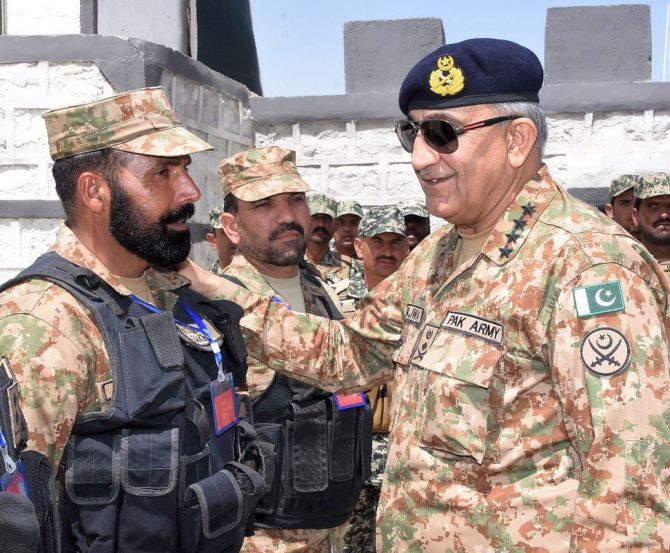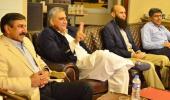Raking up the Kashmir issue, Pakistan Army chief Gen. Qamar Javed Bajwa has reaffirmed Islamabad's support for "self-determination" in Jammu and Kashmir.

He also said the Pakistan Army learnt a lot from the 1965 and 1971 wars with India and has made the country's defence impregnable by developing nuclear weapons.
Addressing the Defence and Martyrs Day ceremony organised at the Pakistan Army headquarters in Rawalpindi on Thursday, attended by Prime Minister Imran Khan, Bajwa said Pakistan supported the people in Jammu and Kashmir in their "struggle for the right to self-determination".
Pakistan observes September 6 as the Defence and Martyrs Day to mark the anniversary of the 1965 war with India.
"We have learned a lot from the wars of 65 and 71. We were able to further strengthen our defence forces in the wake of these wars. Despite difficult economic times, we were able to become an atomic power," Bajwa said.
"September 6, 1965, is an important day in the history of our nation," he said, adding that Pakistani soldiers jumped into the fiery pits of warfare but did not let the country be harmed.
"The bravery shown by our nation during the 1965 war serves as an important lesson and an inspiration to our youth even today," he said.
Prime Minister Khan, in his address, said Pakistan will never fight any other country's war in future and his government's foreign policy will be in the best interest of the nation.
"We will not become part of a war of any other country (in future)...Our foreign policy will be in the best interest of the nation," he said, apparently referring to the country's involvement in neighbouring Afghanistan.
Pakistan was the ally of the United States during the Cold War as it fought the American war with the Soviet Union in Afghanistan.
Khan also praised the Pakistani armed forces for combating terrorism.
"No other nation has fought the war on terror like the Pakistan Army," he said.
He said role of the security forces and intelligence agencies in making the country safer against all threats was unparalleled.
Khan also talked about investing in human capital by sending children to schools and building hospitals and system of merit so that everyone is treated equally on the pattern of first Muslim state of Medina.
"The government will bring meritocracy and transparency in all sectors by following the golden principles of state of Medina," he said.
In an unusual move, Pakistan Army chief Gen. Bajwa has batted for democracy and the need for strengthening of institutions in the coup-prone country, as he shared the dias with Imran Khan.
Bajwa said that continuation of democracy was must for development and progress of the country.
His significant comments came two days after visiting US Secretary of State gave a pep talk to Bajwa on the importance of strong democratic institutions in Pakistan.
The army chief said that for the country's stability and progress, democracy is of utmost importance.
"Democracy cannot blossom without observing the democratic traditions in true spirit and without the strengthening of institutions," he was quoted as saying by Dawn newspaper.
"We have set on this path 10 years ago," he said, apparently referring to the smooth transition of power to civilian leaders in the country after the rule of former military dictator Gen. Pervez Musharraf.
"Today we are more united and more resolute. This is a message that Pakistanis are not ones to fear any crisis and will soar to new heights soon."
Prime Minister Khan, chief of the Tehreek-e-Insaf party is said to have the backing of the powerful military, which has ruled the country for almost half its 72-year history.
In his speech, the army chief emphasised that no individual was above any institution and no institution was above the nation, The News reported.
He said Pakistan's progress depended on the continuation of democracy for which supremacy of the Constitution and institution was required.
General Bajwa pointed out that presence of political leadership and guests from all schools of thought at the Defence and Martyrs Day ceremony testified to the fact that they were committed and united for progress of the country.
"We are also facing a war against poverty, hunger and illiteracy, and to fight it national unity was required and everybody will have to think above themselves."
In his address, Prime Minister Khan termed the often talked-about civil-military divide as a myth.
There was no civil-military tension among the institutions as all have the shared objective of taking the country forward, he said.
"We are all one and together we have to take this country to the new heights," he said.
He said that Pakistan Army is the only intact and functional institution of the country.
"The Pakistan army is running at its best because of non-political interference and its priority for merit," Khan said, adding that "political interference destroys institutions."
US Secretary of State Pompeo, who visited Islamabad on Wednesday, during a meeting with Bajwa, welcomed the smooth transition of power to a new civilian government, spokesperson Heather Nauert said, referring to the assumption of power of cricketer-turned-politician Khan on August 18.
Pompeo stressed the "importance of strong democratic institutions" in Pakistan, State Department spokesperson Heather Nauert said in a readout of the meeting Pompeo had with Gen. Bajwa. -- PTI











 © 2025
© 2025